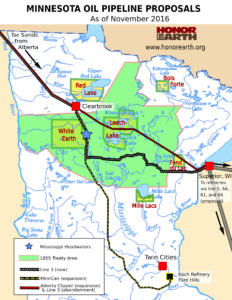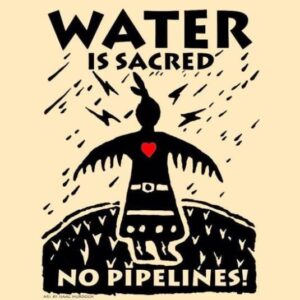Hot summer, hot topic:
How do we respond?
By Madeline Troyer
This year Minnesota broke the summer record for days above 90 degrees before June: There is no arguing that this has been a hot summer. As I sit outside sweating in the heat of the summer here in Minneapolis, things are heating up in a different way at the site of the Line 3 pipeline construction in Northern Minnesota.

A map the Line 3 construction prepared by the group Honor the Earth
Line 3 has become a hot topic for this hot summer. For people of faith, the struggle to discern how best to respond in moments of tension and heated issues like Line 3 is a question of spiritual grounding and thoughtful discernment.
During the 2021 Minneapolis Areas Synod Assembly, voting members debated and passed a resolution opposing the construction of the Line 3 pipeline in Northern Minnesota, primarily due to the environmental impact and the violation of treaties with Indigenous people. The resolution states that “the pipeline construction violates treaties, the supreme law of the land, and threatens waterways, water quality, and the sacred wild rice habitat, causing Anishinaabe Water Protectors to put their lives on the line to stop the Line 3 construction.” At this moment, many Indigenous voices are calling for allies to join in the struggle to end the construction of this pipeline and to envision new systems of life, care for creation, and treaty valuation.
The Line 3 pipeline currently under construction is replacing one built in 1968. The old pipeline is not being removed with the land restored; it will remain in the soil in perpetuity. The replacement line follows a new route, crossing the Leech Lake and Fond du Lac Reservations and treaty areas. 20 rivers, including areas where wild rice — sacred to the Ojibwe people — grows, will be tunneled under. If completed, Line 3 will ship up to 915,000 barrels of tar sands crude oil per day. When put into carbon dioxide terms, this is equivalent to about 50 coal power plants. (More information from environmental groups about the pipeline’s climate impacts can be found here: https://www.stopline3.org/fact-sheets or https://maptheblacksnake.com/)
NUMEROUS INDIGENOUS LEADERS have been seeking support in the effort to halt the construction of the Line 3 pipeline. During the weekend of June 5-7, Indigenous community leaders hosted thousands of people who joined them to protect the treaties, the climate, the water, and the people. The organizers for this event said, “We will not stand by and watch a fossil fuel corporation line its pockets as so much is destroyed, producing oil we don’t need.”
Barb Patterson, a member at Edina Community Lutheran Church in Edina, said that, as she has been taking action to stop Line 3, she has learned the importance of being aware of voices that she had “conveniently ignored” in the past. She also explained that, as treaty violations have been increasingly acknowledged, she has learned she “wants to live in a community where all people’s needs can be heard and respected.”
In “hot topic moments,” the centering of voices most directly impacted is critical. The ELCA’s social statement on creation care concludes that Native people “often have a special understanding of human intimacy with the earth” and “the degradation of the environment occurs where people have little or no voice in decisions.” A multitude of Indigenous voices are calling for the opportunity to continue to maintain “human intimacy” with the earth by protecting their sacred rice waters through which this pipeline is slated to pass. They have tried to be a part of this decision-making process but have lost the lawsuit that they brought to the court and are feeling like their voices are being shut down.

Flyer prepared by those opposing construction of Enbridge’s Line 3 pipeline
Rebecca Schultz from Our Saviours Lutheran Church in Minneapolis recognizes that there is tension around this issue. When she was up north at the Treaty Peoples Gathering in June, some local residents carried signs with the message “We Are Minnesotans for Line 3.” However, she still feels “like the pipeline is not caring for our creation like we are supposed to. Indigenous communities are asking us to be present and I will gladly stand up there and support them.”
Rebecca said that, as Lutherans, “what makes us historically “us” is asking questions about the status quo. We as Lutherans can carry this into our fight for climate justice. It will take a lot of questioning about how we are doing things and how we are going to move away from our consumptive ways.”
Even as the impact of climate change has a more tangible impact, the challenge of taking a stance on hard issues is real. Bishop Ann Svennungsen said in her statement on Line 3 construction that “we don’t have the luxury of sitting on the sidelines. We have to choose between competing claims, conscious of our incomplete knowledge and our own complicity” and we must listen to the “vast majority of Indigenous voices I hear calling us to protect the waters.”
Many theologians argue that Jesus often questioned the status quo of his time, listening carefully to the voices of the marginalized. “The Gospel liberates sin, death, and evil and motivates the Church to care for neighbor and the earth,” according to the ELCA Social Statement on the “Church in Society.” Jesus turned over the tables in the temple and advocated for the poor — those who were being robbed in their house of worship (Mark 11:15-17). Jesus leaned into the tension, listened to the marginalized, and questioned the status quo.
Amid the rising heat of the summer, the intensity of opinions on Line 3 is running hot. There will not be unanimity. But, several Minneapolis Area Synod congregations are engaging in this controversy “between competing claims.”
The resolution concerning the construction of Line 3 that passed at the Minneapolis Area Synod Assembly urged the Office of the Bishop to provide resources for congregants to consider — both information and action opportunities. You are invited to do just that, using the resources below. Members of those congregations that are involved in issues of creation care and racial justice have offered these resources for other congregations to consider during this time.
To learn more:
- This NPR story might serve as a starting point for congregational discussion about the Line 3 pipeline, its environmental impact, its impact on Indigenous siblings, and the need for jobs in Greater Minnesota.
- Read the book Resisting Structural Evil by Cynthia D. Moe-Lobeda.
- Listen to the Shifting Climates Podcast about climate justice and the church.
- Start listening to indigenous voices and learning more about Minnesota’s history.
- Here is one place to start.
To participate in support of those going to the construction site:
- Contact President Biden about taking action to stop construction of Line 3 .
- Call Governor Tim Walz to intervene.
- After researching the information about Line 3, write a letter to the editor and follow and share content from Stop Line 3, Giniw Collective, Honor the Earth, and Resist Line 3 on social media.
To participate in solidarity and presence at the construction site:
- Check out Stop Line 3’s “Come to the Line” page for updated information.
- Attend an orientation training for the frontline work.
- Find an affinity group (2-15 folks) to travel together. If you don’t know anyone else going, there is a new carpool site to find rides to the frontlines on a rolling basis.
- Remember that you are a guest in this community and follow the seven values outlined.
